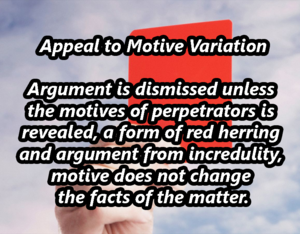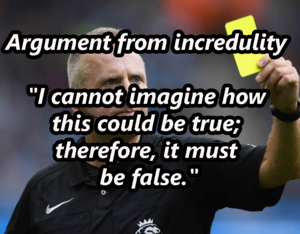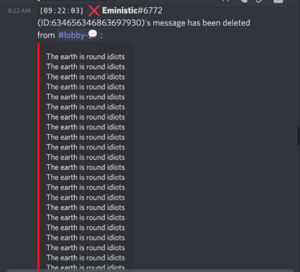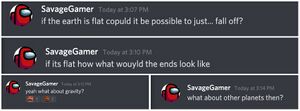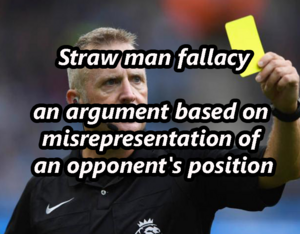Difference between revisions of "Logical Fallacies"
| Line 50: | Line 50: | ||
'''Example:''' "gravity is proven, einstein was the smartest man alive, are you smarter then einstein?" | '''Example:''' "gravity is proven, einstein was the smartest man alive, are you smarter then einstein?" | ||
| + | |||
| + | * [[Appeal to Emotion]] (also known as Argument by Vehemence) Where an argument is made due to the manipulation of emotions, rather than the use of valid reasoning. | ||
| + | |||
| + | '''Example:''' "everyone is happy living with the globe belief, It feels good, you must feel terrible." | ||
* Appeal to Ignorance (Argumentum as Ignorantiam) | * Appeal to Ignorance (Argumentum as Ignorantiam) | ||
Revision as of 00:07, 16 February 2022
Contents
Introduction
Why are fallacies important in examining the globe claim?
One of the reasons that an unverifiable globe model with impossible dimensions has been able to be perpetuated for so long is that there is a serious lack of training in systematic logic. At one time, formal training in logic was an accepted and important part of classical education. It should surprise no one familiar with current world affairs that it is advantageous for those hoarding power and resources to keep the masses uneducated and their minds untrained. By learning about and pointing out the errors in logic known as logical fallacies when they occur, we can retrain our minds to think more logically and clearly about the nature of our world and other important issues.
Formal Fallacies
Formal fallacies relate to the form of the argument, as opposed to informal fallacies which relate to the content of the argument.
- Affirming the consequent (also known as the converse error) is the logical fallacy that happens when the antecedent in an indicative conditional is claimed to be true because the consequent is true.
Example: "if earth is a sphere, then we would see boats disappear bottom up. We see boats disappear bottom up, therefore the earth is a sphere."
- Denying the Antecedent (also known as the inverse error) The consequent in an indicative conditional is claimed to be false because the antecedent is false. That does not prove that it is false.
Example: If we would see forever then the earth would be flat. we don't see forever. therefore the earth is not flat.
Informal Fallacies
Informal fallacies can be determined only through analyzing the content of the argument, as opposed to formal fallacies which relate to the form of the argument.
- Against the Person (also known as Argumentum Ad Hominem) Attacking the person making the argument, rather than the argument itself, when the attack on the person is completely irrelevant to the argument the person is making.
Example: "Those who think the earth is flat must have never have completed elementary school."
- Appeal to Bias (also known as Naive cynicism) Suggesting that the person who is making the argument is biased or predisposed to take a particular stance, and therefore, the argument is necessarily invalid.
Example: "you just want to be different, that is why you believe its flat."
- Appeal to Authority (also known as Argumentum ad verecundiam) an assertion is deemed true or False because of the position or authority of the person asserting it, without any other supporting evidence offered.
Example: "I saw on television that the entertainer Bill Nye says that the Earth is a globe because ships disappear over the horizon."
- Appeal to False Authority (also known as Argument from false authority) Using an alleged authority as evidence in your argument when the authority is not really an authority on the facts relevant to the argument.
Example: "My Uncle is a government official, he told me the earth is a globe."
- Appeal to Accomplishment (also known as Appeal to success) occurs when an argument is sheltered from criticism or evaluated based on the percieved accomplishments or success of the person or argument, rather than on the merits of the arguments itself.
Example: "gravity is proven, einstein was the smartest man alive, are you smarter then einstein?"
- Appeal to Emotion (also known as Argument by Vehemence) Where an argument is made due to the manipulation of emotions, rather than the use of valid reasoning.
Example: "everyone is happy living with the globe belief, It feels good, you must feel terrible."
- Appeal to Ignorance (Argumentum as Ignorantiam)
Example: "Flat earth has no working model, therefore it must be wrong."
- Argument From Incredulity (Appeal to Common Sense)
Example: "Common sense dictates that we live on a globe."
- Appeal to Motive is the fallacy where the argument is dismissed unless the motives of the perpetrators are revealed.
Example: "Why would they lie?"
- Argumentum Ad Nauseam (also known as an argument by repetition) is the logical fallacy that something becomes true if it is repeated often enough.
Example: "The earth is round. The earth is round. The earth is round. The earth is round."
- Appeal to Force (Argumentum ad Baculum: Appeal to the "Stick"): When this fallacy is employed, force or the threat of force is used instead of reason to justify a conclusion.
Example: "Those who believe in flat earth should have their children forcibly removed from their home."
- Appeal to Pity (Argumentum as Misericordiam): With this fallacy, an attempt is made to distract from the truth of the conclusion by inspiring pity."
Example: "These Flat Earth Discord mods keep muting me and suppressing my freedom of speech."
- Appeal to the People (Argumentum ad Populum)
Example: "Of course we live on a globe. 99% of the people understand this."
- Begging the Question (Petitio Principii)
Example: "Using the given earth radius of 3959 miles, I can easily show you that we live on a globe."
- Dicto Simpliciter (Sweeping Generalization Fallacy): In this fallacy, a general rule or observation is treated as universally true regardless of the circumstances or people concerned.
Example: "All flat earthers approach flat earth from a religious viewpoint, so as an atheist I can't possibly take any of the evidence seriously."
- Escape To The Future: This fallacy consist of an appeal to some future time when the claim made will become evident to all.
Example: "I can't wait until the day when the average citizen can buy a ticket to Mars and all of you flat earthers will be proven wrong."
- Gish Gallop: Attempting to overwhelm a debate opponent by introducing a large number of topics on a shallow basis in rapid succession
Example: "But what about ships over the horizon? Is gravity real? Where's the edge? Why can't I fall off? Why would they lie? How do seasons work?"
- Missing the Point (Ignoratio Elenchi): Reaching a conclusion that doesn't address the point in question
Example: "The Earth can't be flat, because most flat earthers get their information from The Bible."
- Non Sequitur: Drawing a conclusion that doesn't logically follow from previous statements
Example: "The moon and sun are round, so the Earth must be too."
- Red Herring: In the red herring fallacy, attention is diverted to a topic that only has surface relevancy to the topic at hand.
Example: "You say the earth measures flat. What about gravity?"
- Straw Man
Example: "Flat earthers think the earth is a disc flying through space, but why would the earth be a different shape than other planets?"
- Suppressed Evidence
Example: "Everyone knows we live on a globe, and there has never been any scientific evidence found to dispute this idea."
- Wishful Thinking: This fallacy occurs when the desire for something to be true is used in place of actual evidence for the claim.
Example: "I know the Earth is a ball because I saw curvature out of a plane window."
Recommended Resources
Free Logic & Proofs Course through Carnegie Mellon University: https://oli.cmu.edu/courses/logic-proofs-copy/
Free logic course from LumenLearning https://courses.lumenlearning.com/atd-pima-philosophy/chapter/1-1-arguments-the-basics/
References
Bluedorn, Nathaniel, et al. The Fallacy Detective: Thirty-Eight Lessons on How to Recognize Bad Reasoning. Christian Logic, 2015.
Cline, Austin. “What Is Suppressed Evidence Fallacy?” ThoughtCo, 13 Nov. 2019, https://www.thoughtco.com/suppressed-evidence-fallacy-250354
Hurley, Patrick J. A Concise Introduction to Logic. Wadsworth, 1988.
Logically Fallacious, Archieboy Holdings, LLC, 2020, https://www.logicallyfallacious.com/.
Nordquist, Richard. “What Is the Logical Fallacy Known as Dicto Simpliciter?” ThoughtCo, Dotdash, 19 June 2019, www.thoughtco.com/dicto-simpliciter-logical-fallacy-1690451.
Scienta, Petros B. Argument to the Future / Escape to the Future, Nov. 2016, https://www.seekfind.net/Argument_to_the_Future__Escape_to_the_Future.html#.YGW1VhNKgWo.
Owen M. Williamson, The University of Texas; Master List of Logical Fallacies: https://utminers.utep.edu/omwilliamson/ENGL1311/fallacies.htm
